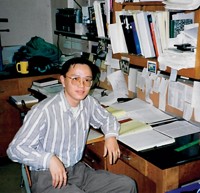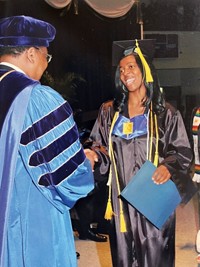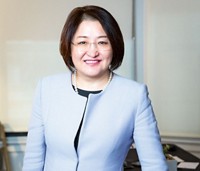Advertisement
Grab your lab coat. Let's get started
Welcome!
Welcome!
Create an account below to get 6 C&EN articles per month, receive newsletters and more - all free.
It seems this is your first time logging in online. Please enter the following information to continue.
As an ACS member you automatically get access to this site. All we need is few more details to create your reading experience.
Not you? Sign in with a different account.
Not you? Sign in with a different account.
ERROR 1
ERROR 1
ERROR 2
ERROR 2
ERROR 2
ERROR 2
ERROR 2
Password and Confirm password must match.
If you have an ACS member number, please enter it here so we can link this account to your membership. (optional)
ERROR 2
ACS values your privacy. By submitting your information, you are gaining access to C&EN and subscribing to our weekly newsletter. We use the information you provide to make your reading experience better, and we will never sell your data to third party members.
ACS News
Amazing Women
Project SEED scholar Rita Baskett
A pharmacist’s journey to being a business owner
by Melissa Gilden
December 14, 2018
| A version of this story appeared in
Volume 96, Issue 49

Rita Baskett says she felt like an outsider when she was first placed in a lab through the American Chemical Society Project SEED program. Many of the other students in the labs were family members of researchers, she says. “But I came a different route.”
Vitals
▸ Hometown: East Orange, New Jersey
▸ Year in Project SEED: 1989
▸ Education: BS, pharmacy, Long Island University; MBA and MHA, Pfeiffer University
▸ Current position: CEO, Integrated Pharmacy Services
▸ Advice to students: “Exposure to all disciplines can help shape your path. Never turn down an opportunity to explore something new.”
Baskett’s father immigrated to the US from the British Virgin Islands with a fifth-grade education. Her mother, a high school graduate, was a crossing guard in Baskett’s hometown of East Orange, New Jersey. One of Baskett’s sisters joined the military, while the other was the first in her family to graduate from college. “I was the second!” Baskett says.
Baskett says she always had an interest in the sciences and was a part of her high school’s math and science club. Her chemistry teacher told her about Project SEED, which provides summer research experiences to high school students from economically disadvantaged backgrounds. That summer, Baskett was placed in a microbiology lab at the New Jersey Institute of Technology. “That was my first introduction to the working world of science,” she says. “I had a great time that summer and was able to earn some money as well.” Baskett says she also had a part-time job she went to in the evenings. “I always had a job. I always had two jobs,” she says.
The next summer, Baskett worked in a toxicology lab at Roche. “It was eye opening to me,” she says. “It really spurred my interest in medicine and pharmacy.” Baskett spent the next two summers in a toxicology lab at Ciba-Geigy. After four summers in labs, she says, she knew she wanted to be a scientist. “So I started college with that in my brain.”
As a dual biology and chemistry major at Fairleigh Dickinson University, Baskett knew she wanted to do research, but she wanted a quicker route to the workforce than a PhD would allow. The dean of FDU recommended a joint pharmacy program with Long Island University. Already familiar with the pharmaceutical world from her time in Project SEED, Baskett decided that was the program for her. A few years later, she graduated from LIU with a bachelor’s degree in pharmacy.
Advertisement
A few years and a couple of retail pharmacy jobs later, Baskett’s father died, and she was ready to relocate. She moved from her native New Jersey to take a job with Eckerd Pharmacy in North Carolina, when things took a bit of a turn. At 29 years old, Baskett was diagnosed with breast cancer. “That threw a monkey wrench in a lot of things,” she says. While taking time off to heal, Baskett started looking into careers that weren’t as hard on the body as retail pharmacy. She enrolled in a dual master’s program in business and health administration through Pfeiffer University and worked in hospital administration before moving on to an advocacy organization based in Washington, DC, called 340B Health as its director of pharmacy and educational services.
From there, Baskett moved on to Premier Pharmacy Services as its director of pharmacy consulting. In 2013, now with a young daughter, Baskett was diagnosed again with breast cancer. In 2015, the two-time cancer survivor opened the consulting firm Integrated Pharmacy Services (IPS), of which she is now CEO. Her firm does consulting and compliance auditing for hospitals and other health centers that are a part of the 340B Drug Pricing Program, which helps them save money on outpatient prescriptions.

“Running IPS is a big deal for me,” she says. “To be able to be my own boss and an entrepreneur, and also being a minority woman,” is something she thinks about as she competes with large consulting firms for contracts.
Project SEED was instrumental in propelling Baskett to where she is today. “It helped give me those steps to bring me onto the career path that I chose,” she says. “If it wasn’t for Project SEED, I don’t know what track I would have pursued.”





Join the conversation
Contact the reporter
Submit a Letter to the Editor for publication
Engage with us on Twitter